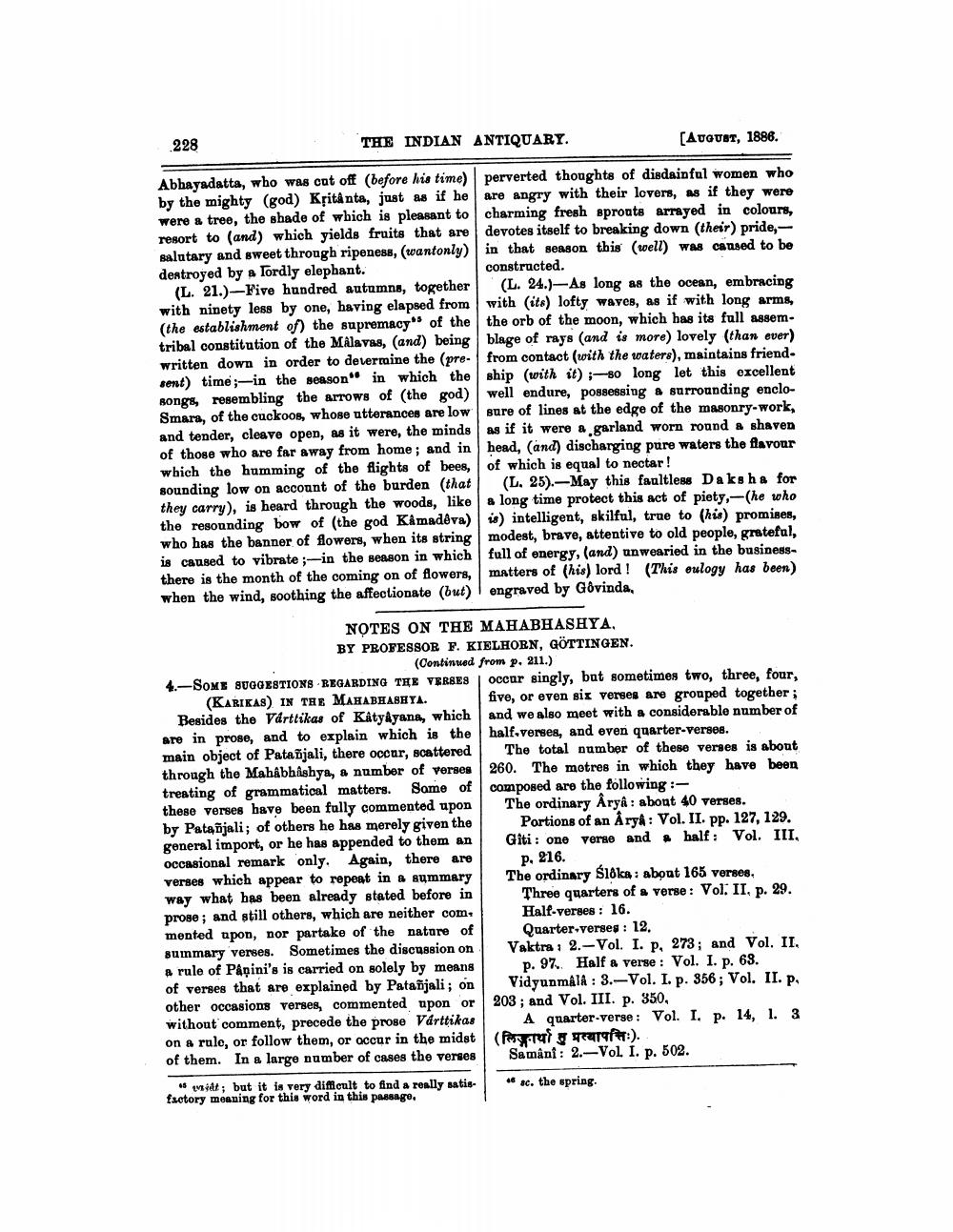________________
228
THE INDIAN ANTIQUARY.
(AUGUST, 1886.
Abhayadatta, who was cut off (before his time) perverted thoughts of disdainful women who by the mighty (god) Ksitâ nta, just as if he are angry with their lovers, as if they were were a tree, the shade of which is pleasant to charming fresh sprouts arrayed in colours, resort to (and) which yields fruits that are devotes itself to breaking down (their) pride,salutary and sweet through ripeness, wantonly) in that season this (well) was caused to be destroyed by a Tordly elephant.
constructed. (L. 21.)-Five hundred autumns, together (L. 24.)- As long as the ocean, embracing with ninety less by one, having elapsed from with its) lofty waves, as if with long arms, (the establishment of) the supremacy" of the the orb of the moon, which has its full assemtribal constitution of the Mâlavas, (and) being blage of rays (and is more) lovely (than ever) written down in order to devermine the (pre- from contact (with the waters), maintains friend. sent) time ;-in the season in which the ship (with it) ;-80 long let this excellent Bongs, resembling the arrows of (the god) well endure, possessing a surrounding encloSmara, of the cuckoos, whose utterances are low bure of lines at the edge of the masonry-work, and tender, cleave open, as it were, the minds as if it were a garland worn round a shaven of those who are far away from home; and in head, (and) discharging pure waters the flavour which the humming of the flights of bees, of which is equal to nectar! sounding low on account of the burden (that (L. 25).--May this faultless Daksha for they carry), is heard through the woods, like a long time protect this act of piety,-(he who the resounding bow of (the god Kamadeva) is intelligent, skilful, true to (his) promises, who has the banner of flowers, when its string modest, brave, attentive to old people, grateful, is caused to vibrate ;-in the season in which full of energy, (and) unwearied in the businessthere is the month of the coming on of Aowers, matters of (his) lord ! (This eulogy has been) when the wind, soothing the affectionate (but) engraved by Govinda,
NOTES ON THE MAHABHASHYA. BY PROFESSOR F. KIELHORN, GÖTTINGEN.
(Continued from p. 211.) 4.-SOME SUGGESTIONS REGARDING THE VERBES occur singly, but sometimes two, three, four,
(KARIKAS) IN THE MAHABHASHYA. five, or even six verses are grouped together; Besides the Varttikas of Kâtyâyana, which and we also meet with a considerable number of are in prose, and to explain which is the half.verses, and even quarter-verses. main object of Patañjali, there occur, scattered The total number of these verses is about through the Mahabhishya, a number of verses 260. The motres in which they have been treating of grammatical matters. Some of composed are the following:these verses have been fully commented upon The ordinary Arya: about 40 verses. by Patañjali; of others he has merely given the Portions of an Arya : Vol. II. pp. 127, 129. general import, or he has appended to them an Giti: one verse and half: Vol. III, occasional remark only. Again, there are p. 216. verses which appear to repeat in a summary The ordinary Ś18ks : about 165 verses, way what has been already stated before in Three quarters of a verse: Vol. II, p. 29. prose; and still others, which are neither com, Half-verses: 16. mented upon, nor partake of the nature of Quarter-verses : 12. summary verses. Sometimes the discussion on Vaktra : 2.-Vol. I. p. 273; and Vol. II, a rule of Pâqini's is carried on solely by means p. 97. Half a verse : Vol. I. p. 63. of verses that are explained by Patañjali; on Vidyunmalá : 3.-Vol. I. p. 356; Vol. II. p. other occasions verses, commented upon or 203; and Vol. III. p. 350. without comment, precede the prose Várttikas A quarter-verse: Vol. I. p. 14, 1. 3 on a rule, or follow them, or occur in the midst (Payrol year ). of them. In a large number of cases the verses Samâni : 2.-Vol. I. p. 502.
midt; but it is very difficult to find a really satis factory meaning for this word in this passage.
ac. the spring.




